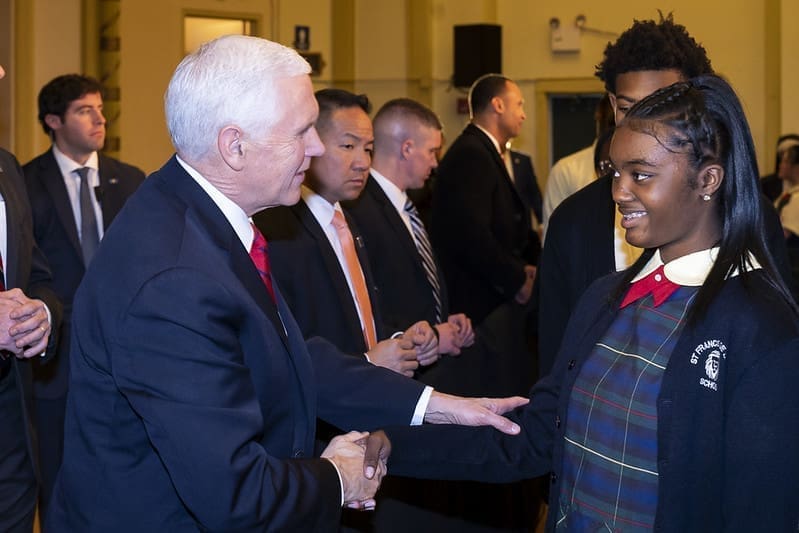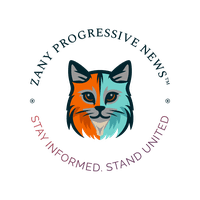Conservatives are pushing “school choice” as a key issue this election, with several state legislatures developing universal school vouchers policy to divert taxpayer money intended for public K-12 schools to instead subsidize private school tuition.
Zany: I’ll make this commentary brief. (Probably won’t be, but it’s the thought that counts, right?)
I didn’t really know what “School choice” was before I heard Trump mention it a few times during his rallies in 2019. After that I saw conservatives posting about it on Twitter and my oldest son talked about it once, challenging me on how it could possibly be a “bad thing” saying, “If you live in a district with a sh***y school, you don’t have to send your kid there! Parents that couldn’t afford to send their kids to a private school can now.”
I wasn’t sure why I thought it was a bad thing—I didn’t know much about how it worked—but it was probably the fact that Republicans were the ones pushing for it. (If Republicans want something, its usually not good for the average American.)
Once I learned how it would decimate public schools and divert their funding to private schools instead, it all made sense as to why Donald Trump and Republicans were pushing for it.
Not only to divert public school funding to private schools, but to Christian schools. Christian Nationalist indoctrination, perhaps? I wonder how many conservatives take the time to look into it instead of just buying the “freedom to choose” talking point?
I’ll leave you with a factoid about the costs associated with universal school voucher programs packaged in a neat little box so you can click the little birdie and share it with friends. 😁
—Study by the Grand Canyon Institute
Sharing is caring! Thanks!
Now back to the regularly scheduled programming. Here’s the article about the school voucher programs being pushed by Republicans in local, state, and federal government.
By 19th News
Originally published by Reckon.
These programs – otherwise known as school vouchers – are touted as promoting educational equality by making private schools accessible and affordable for all students. The 2024 Republican National Convention supported “universal school choice” in every state as a means to unburden students from “political meddling” in educational environments.
Tennessee Gov. Bill Lee cited school choice during the gathering as “the civil rights issue of our time.” Also, Arizona in 2022 adopted the nation’s largest state-wide school voucher program which purports to benefit more than 68,000 students.
However, a growing body of evidence shows school vouchers have the potential to wreak deep monetary and academic havoc on the children those programs claim to serve.
“You’ll hear this message that these programs give a child a chance who might otherwise not have an opportunity, when in reality when they end up in private schools, oftentimes they’re not thriving because there is more to school than academics,” National School Boards Association (NSBA) CEO and Executive Director Verjeana McCotter-Jacobs told Reckon.
The NSBA is a nonprofit organization dedicated to providing children “excellent and equitable” public education by representing and advocating for state school boards and their members.
Numerous studies have shown a range of adverse educational effects stemming from school voucher programs.
In an analysis of the Opportunity Scholarship Program in Washington D.C., the Institute for Education found students who used vouchers scored lower in mathematics and reading tests after two years in the program.
The D.C. program offers scholarships of up to $15,000 for public school students to attend private institutions and provide “quality education” regardless of socioeconomic background, but the Center for American Progress found that the effects of the program put students behind in school by more than nine weeks.

Analyses of school voucher programs in Louisiana, Ohio and Indiana reinforce that finding.
McCotter-Jacobs said a significant portion of the disadvantages that come with school voucher programs stem from a lack of accountability.
“They don’t have the same requirements that public schools have, whether it’s around standardized testing or whether students are actually benefiting from the diversion of public funds to private entities,” she said.
Some states like Wisconsin and Florida have established guidelines in an effort to ensure the quality of education provided by private schools, but many other regions have yet to follow suit. Executive Director of Save Our Schools Arizona (SOSA) Beth Lewis worries about that lack of oversight, especially in her community.
“I’m not a huge proponent of standardized testing, but if you’re going to force a system on the public, then public schools, district schools and charter schools all have to take the same test,” Lewis told Reckon. “If you’re going to publicly fund a private school, then they should have to take the same test. Parents should be able to have insight into those factors when they’re making a decision.”
SOSA is a nonprofit school advocacy organization that has strongly opposed Arizona’s voucher program.
Lewis added that a lack of standardization between public and private schools makes it difficult for parents to track their children’s academic growth once they make the switch to a private institution.
“You can’t be for parental choice and then not actually have any information for parents at the school,” she said.
In addition to the academic risks, school vouchers can also be an enormous financial drain.
The Grand Canyon Institute found the 2022 school voucher program in Arizona, championed by conservatives as providing families affordable educational freedom cost the state $332 million in the 2024 fiscal year — more than five times the original estimate of $64.5 million.
Secretary-treasurer of the American Federation of Teachers Frederick Ingram told Reckon that parents concerned for their children’s education need to consider alternatives that do not leach assets from other areas of the community.
The AFT is the nation’s second largest labor union for teachers and advocates for high-quality public education and public services for students, their families and their communities.
“As a parent and educator, I’m not here to tell parents to ignore all the education options they have for their children,” Ingram said. “I am here to say we can meet our kids’ needs without draining the funds and resources from the public schools that 90 percent of students attend and that have been the center of our communities for decades.”
The Learning Policy Institute, a national nonprofit organization which conducts research in order to improve education policy, found that more than 71 percent of enrollees in Arizona’s voucher program did not previously attend a public school, leading to increased costs from program enrollees receive public school funds regardless of which school they previously attended.
“If there’s a family that’s always been in private schools and the school system just gives them a voucher for some financial help, how does that help public schools?” McCotter-Jacobs said.
Lewis agrees, adding that the voucher system ultimately forces the state to subsidize what were previously personal expenses.
“It kind of speaks to the issue of school choice,” Lewis said. “People aren’t making different choices, we’re just funding people’s existing private choices.”
Ingram added the wasteful and exclusionary nature of school vouchers can be traced partially to the programs’ history as a means to subvert the Civil Rights Movement and efforts to integrate education.
“We already know how vouchers hurt our schools financially and bankrupt state budgets, but too many of us don’t know their history as a tool of racial discrimination,” Ingram said. “Parents should be aware of vouchers’ history of fraud and waste. And they should know that, despite what extremist politicians say, most voucher recipients are wealthy families whose kids already attend private schools.”
McCotter-Jacobs called on policymakers and the public to educate themselves with available data in order to make decisions that benefit children, families and communities.
“It’s really about keeping the fight going and testifying to outcomes,” McCotter-Jacobs said “We need to make data driven decisions, and the data just doesn’t support overall success in voucher programs.”
Ingram added those who support their public schools need to work and exercise their right to vote in order to appoint policymakers who accurately represent their community’s values.
“If a community wants to save its public schools from the threat of privatization and vouchers, it needs to turn those poll numbers into votes and elect the women and men who not only believe in public education but will fight for it,” Ingram said. “And that starts with the community turning away voucher-wielding MAGA extremists — the wolves at the schoolhouse door.”
Andrew Fortin-Caldera is a California-based journalist. He has covered entertainment with CNN, infrastructure with the San Francisco Examiner and breaking news with NBC and City News Service. He has also served as a journalism coach as part of the Daily Bruin Alumni Network and the JCal program.
This post contains content that was first published on 19th News and republished here under a Creative Commons License. Read the original article.









